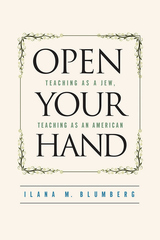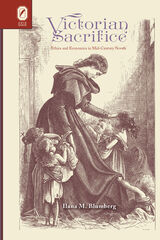2 books by Blumberg, Ilana

Open Your Hand
Teaching as a Jew, Teaching as an American
Ilana M. Blumberg
Rutgers University Press, 2019
Fifteen years into a successful career as a college professor, Ilana Blumberg encounters a crisis in the classroom that sends her back to the most basic questions about education and prompts a life-changing journey that ultimately takes her from East Lansing to Tel Aviv. As she explores how civic and religious commitments shape the culture of her humanities classrooms, Blumberg argues that there is no education without ethics. When we know what sort of society we seek to build, our teaching practices follow.
In vivid classroom scenes from kindergarten through middle school to the university level, Blumberg conveys the drama of intellectual discovery as she offers novice and experienced teachers a pedagogy of writing, speaking, reading, and thinking that she links clearly to the moral and personal development of her students.
Writing as an observant Jew and as an American, Blumberg does not shy away from the difficult challenge of balancing identities in the twenty-first century: how to remain true to a community of origin while being a national and global citizen. As she negotiates questions of faith and citizenship in the wide range of classrooms she traverses, Blumberg reminds us that teaching - and learning - are nothing short of a moral art, and that the future of our society depends on it.
[more]

Victorian Sacrifice
Ilana M Blumberg
The Ohio State University Press
In Victorian Sacrifice: Ethics and Economics in Mid-Century Novels, Ilana Blumberg offers a major reconsideration of the central Victorian ethic of self-sacrifice, suggesting that much of what we have taken to be the moral psychology of Victorian fiction may be understood in terms of the dramatic confrontation between Christian theology and the world of modern economic theory. As Victorian writers Charlotte Mary Yonge, Charles Dickens, George Eliot, Anthony Trollope, Wilkie Collins, and Mary Augusta Ward strove to forge a practicable ethics that would reconcile the influences of an evangelical Christianity and its emphasis on selfless charity with the forces of laissez-faire capitalism and its emphasis on individual profit, they moved away from the cherished ideal of painful, solitary self-sacrifice in service of another’s good. Instead, Blumberg suggests, major novelists sought an ethical realism characterized by the belief that virtuous action could serve the collective benefit of the parties involved. At a mid-century moment of economic optimism, novelists transformed the ethical landscape by imagining what the sociologist Herbert Spencer would later call a “measured egoism,” an ethically responsible self-concern which might foster communal solidarity and material abundance.
Bringing the recent literary turns to ethics and to economics into mutual conversation, Blumberg offers us a new lens on a matter as pressing today as 150 years ago: the search for an ethics adequate to the hopes and fears of a new economy.
[more]
READERS
Browse our collection.
PUBLISHERS
See BiblioVault's publisher services.
STUDENT SERVICES
Files for college accessibility offices.
UChicago Accessibility Resources
home | accessibility | search | about | contact us
BiblioVault ® 2001 - 2024
The University of Chicago Press









